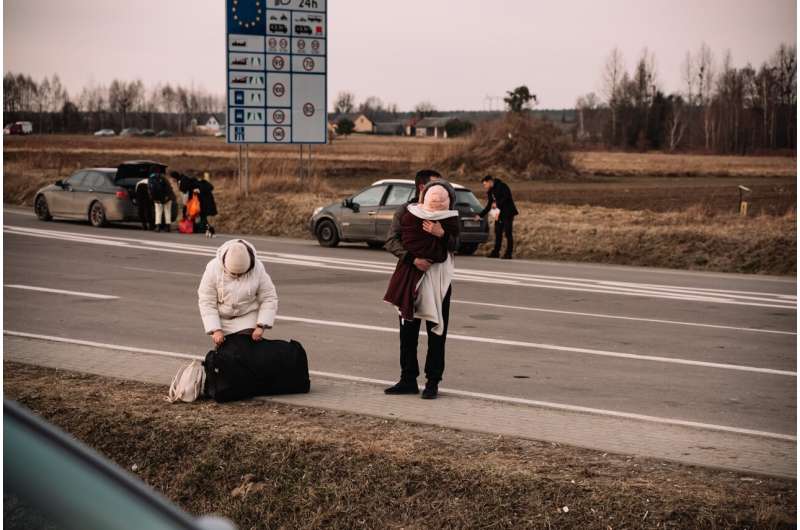Most countries do not take a fair share of refugees. Here's how we could incentivize them

Since its introduction in 1951, the has been the basis for the global refugee system. It defines who a refugee is and outlines the rights they are entitled to.
More than 70 years later, the world is more connected and the nature of migration and asylum has changed. UK home secretary James Cleverly (as well as his predecessor Suella Braverman) has that such migration treaties are no longer fit for purpose.
In a recent speech in the US, Cleverly rightly pointed out that migration has "been accelerated … by modern technology and transport," and that globally today, 3.6% of people are migrants. Cleverly did not mention that this proportion has been surprisingly .
However, we need to draw a distinction here between migration generally and refugee numbers. While the proportion of migrants generally has been stable, refugee numbers have more than doubled in the past decade, going . This has been primarily driven by protracted conflicts in . These have led millions to flee war, persecution and violence in their home countries.
With that in mind, Cleverly has a point: the global asylum system is facing significant challenges. This is because some countries are taking more responsibility than others. It is not, therefore, a truly global system.
Today, are hosted in countries neighboring where the people flee from. These are most often developing countries. In Lebanon, refugees comprise 15% of the population. In sharp contrast, in the UK the proportion stands at 0.5% and in Japan at 0.01% (based on and data for 2022).
While a few countries take most of the responsibility for refugees, many others shun cooperation. The result is that very few refugees are able to reach safety. According to the UN, globally, only about in 2022 were able to access resettlement schemes and travel to a destination country safely and legally.
Many countries offer safe and legal routes to people in need of protection. The UK resettled people in 2023, and has schemes for people from Ukraine, Hong Kong and Afghanistan. But there are many more people seeking protection from elsewhere in the world. In the absence of safe and legal routes, many will attempt to enter countries like the UK through irregular means, such as via small boats.
The refugee convention outlines what states must do to offer protection and support and to whom. It does not, however, have any mechanisms to make sure responsibility is equally shared between states.
Political challenges
Cleverly correctly noted that "any approach to global migration that is not rooted in international cooperation is doomed to fail." The answer is not to simply do away with current migration treaties, but to build on them, creating a system that meets refugees' needs for protection while requiring states to fairly share responsibility.
Scholars have long explored the possibility of a to ensure that refugee protection is . But such a system seems impossible in the current political climate.
Wealthier countries are skeptical of taking more refugees—and anti-immigration sentiment is on the rise. The recent, non-binding, international agreements on responsibility-sharing for migration and refugee protection. Much of the opposition to these agreements was promoted by far-right and anti-immigrant .
Despite this political difficulty, there could be ways to incentivize states to take more responsibility, without a legally binding system. One suggestion is to introduce a , run by the UN refugee agency, that publicly ranks countries by how much they are doing to protect refugees.
States contribute in different ways to refugee protection, including by hosting refugees, by creating legal pathways to protection and by providing funds to the UN refugee agency. An index that accounted for all of this would make it clearer which countries are doing more or less.
Evidence from other sectors suggests that governments can be incentivised to make changes in order to . For example, naming and shaming by the UN and non-governmental organizations has been found to such as during civil wars, and global indices can help .
International reputation can play a role in the development of migration policies too, as we saw with the introduction of .
From safety to integration
A global refugee system also requires a more cooperative, less polarized discussion about migration—one that the phenomenon can have on some local communities, but also refugees' immense , and European economies' for foreign workers.
More work needs to be done in host countries to help refugees integrate and avoid marginalization and discrimination. This could be through cultural exchanges between citizens and refugees, such as , or .
Several studies have shown that promoting citizens' interactions with, and exposure to, migrants and refugees can and .
Research suggests that , rather than figures and facts, might have a greater role in encouraging positive views of immigration.
Provided by The Conversation
This article is republished from under a Creative Commons license. Read the .![]()



















